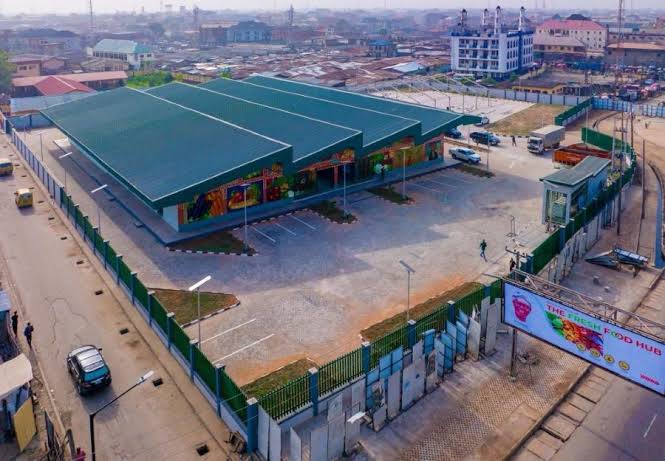Lagos State Governor Babajide Sanwo-Olu, on Sunday, launched a fresh palliative scheme for low-income traders across local markets in the State, as part of measures being taken to cushion the effect of the current economic realities.
The Governor rolled out Lagos Market Trader Money, which, in the first phase, will provide N50, 000 business support grants to 15,000 struggling traders across the 57 Local Government Areas of the State.
Sanwo-Olu announced the scheme in Idi-Oro, Mushin, where he led the Deputy Governor, Obafemi Hamzat and cabinet members, to commission a newly constructed middle-level Fresh Food Agro hub built by the State Government to sustain the food supply chain.
The Governor said market leaders in each council had been asked to nominate 200 each in community markets in all the councils, with the list cutting across small markets. Disbursement of funds to beneficiaries, he said, would begin on Monday (tomorrow), with the Ministry of Agriculture coordinating the payment.
He said: “As part of the measures to cushion the effect of the current economic realities, we have come up with an intervention for all low-income market women and men struggling to sustain their micro and small businesses in this period. Today, we are launching Lagos Market Trader Money, which is a palliative measure to support traders in our local markets.
“The first 15,000 beneficiaries will be getting a support of N50,000 from the State Government. Traders in big markets are excluded from this scheme. Leaders of community markets across 57 local councils will submit 200 names each that must be divided among 10 markets in each domain. Beyond this, the Iyaloja and Babaloja (market leaders) will personally select an additional 50 beneficiaries each.”
The scheme, Sanwo-Olu said, will be extended to markets in military and police barracks, which would provide 750 beneficiaries of the support grant.
The Governor said inauguration of the middle-level Fresh Food Agro Market in Mushin was another milestone achieved by his administration towards realising food security objectives. He stressed that the facility, which is the first in the State, heralded a turning point in Lagos food distribution system and modernisation of existing markets.
The Sanwo-Olu administration, in 2021, initiated a roadmap for a coordinated food security and distribution network in Lagos, embarking on the construction of Food Security Systems and Central Logistics Park in Ketu-Ereyun, Epe. This central hub will serve middle-level markets across the Local Government Areas.
The State Government has a plan to build 50 middle-level agro hubs, with the Governor disclosing that plans were underway to construct three of such markets in Agege, Ajah and Abule Ado.
Sanwo-Olu said his administration adopted food system transformation initiative as a measure to improve existing market system in Lagos, which, he said, was inundated by wastages, post-harvest losses, traffic congestion and logistical inefficiencies that regularly resulted in loss of over 50 per cent of perishable agricultural produce.
He said: “This formal commissioning of a middle-level Agro Produce hub in Idi Oro, Mushin, is another milestone towards achieving our food security objectives. This facility, which is the first in the State, heralds a turning point in the State food distribution system. This transformation journey is hinged on our five-year Agricultural Food System Roadmap, which reflects our passionate commitment to boosting food production, processing and marketing.
The roadmap sets the stage for direct intervention, strategic collaboration and establishment of linkages with the private sector, financial institutions, foreign investors and multilateral agencies. Our food system is categorised into the Central Logistics Hub, Mid-level Agro-produce Hub, and the Last Mile Food Distribution outlets. Inefficiencies observed in the existing market system make it imperative to address the central problem of the food supply systems.
“These efforts have continued to yield the desired result in increased food production. The middle-level Agro Produce hub will pave the way for the modernisation, reorganisation and presentation of state-of-the-art data-driven food and agriculture systems where players and actors in the marketing chain interact freely. This will also address prevailing market challenges of inadequate infrastructure, food shortage, high degree of fragmentation and standardisation.”
Commissioner for Agriculture, Ms. Abisola Olusanya, said the middle-level Fresh Food market maximized storage of wet and dry food to cut down losses and waste. She added that the facility had addressed unhealthy display of food items by traders, while affording consumers to utilise economic scale and buy large quantities of fresh farm produce at the affordable prices.
“This will give consumers a new experience of shopping for fresh Agro products in a safe environment that caters for their needs. This sustainable model of food production and supply system is being pioneered by Governor Sanwo-Olu. This is the right way to go for us as a country to ensure food security is taken seriously,” the Commissioner said.
Iyaloja of Mushin, Alhaja Taibat Borokinni, led traders to the Governor to show their appreciation for the completion of the market and the palliative scheme.
She said: “It is our turn today to benefit from the good initiative introduced by our Governor to improve our markets. This gesture is the reciprocation of our support for the Governor. We have never regretted our decision and we will support other initiatives being taken to better the lives of market men and women.”
Member representing Mushin Federal Constituency 2, Toyin Fayinka, thanked the Sanwo-Olu for seeing to the completion of the market project. He said Mushin became the first council to make the food security vision of the Governor a reality.
“This is a wakeup call to other Local Governments to give chances to projects like this in their domains in order to support the food security agenda of the State Government,” Fayinka said.

